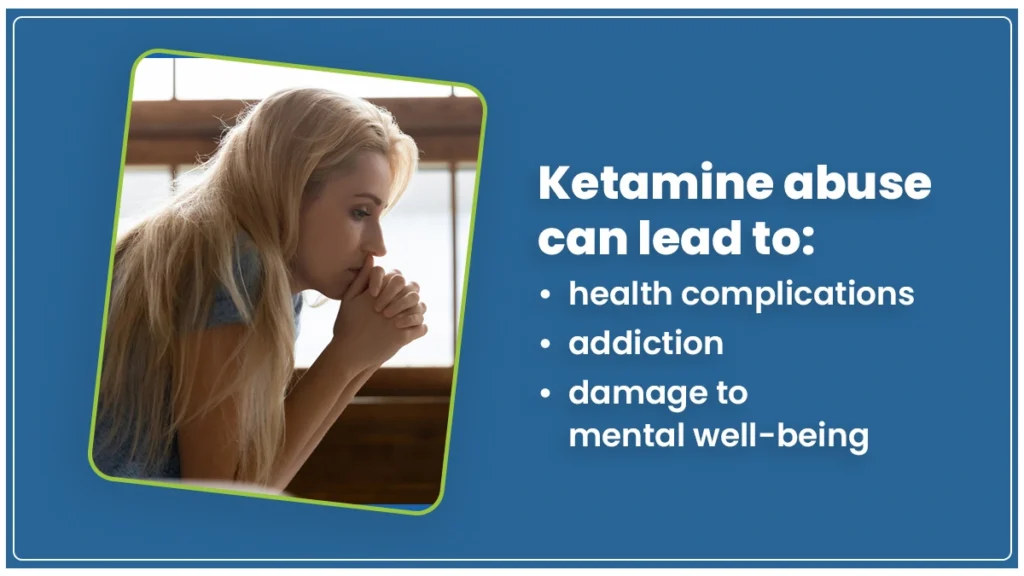Ketamine abuse involves the misuse of a powerful anesthetic and hallucinogenic drug called ketamine, typically used in medical settings for anesthesia, pain relief, and treatment-resistant depression. However, when taken recreationally, it can lead to harmful effects on the mind and body.
Abuse of ketamine often occurs in social settings or parties, where individuals seek its euphoric and out-of-body effects. Its misuse can result in serious health risks, including addiction, impaired motor function, memory issues, and psychological distress.
Treatment Services
Various treatment services available are for ketamine abuse, offering hope for recovery. Detox programs assist individuals in safely managing withdrawal symptoms under medical supervision. Inpatient rehabilitation facilities provide structured environments for recovery.
Behavioral therapies help address underlying issues and teach coping skills to manage cravings. Medication-assisted treatment (MAT) might also be utilized to ease withdrawal and reduce relapse risks. Support groups offer peer support and guidance throughout the addiction recovery process.
Key Takeaways
Ketamine abuse involves the misuse of a powerful anesthetic for its hallucinogenic effects. Here is what you need to know about this drug of abuse:
- Ketamine abuse may stem from different factors and manifests in the form of physical and psychological symptoms.
- Abuse of ketamine can lead to both short- and long-term effects, highlighting the need for comprehensive treatment.
- Various ketamine addiction treatment options are available, including medical detoxification and residential rehab.
The Haven Detox-New England offers personalized treatment options for drug use disorders. Call us at (844) 933-4145 for more information.

Identifying Ketamine Abuse: Signs and Symptoms
Ketamine, originally developed as an anesthetic, is misused for recreational purposes due to its hallucinogenic and dissociative effects. Misuse of ketamine can lead to various physical and mental health issues. Recognizing the symptoms of ketamine abuse is vital for seeking timely help.
The following are symptoms associated with ketamine abuse:
- Increased Heart Rate and Blood Pressure: Ketamine can lead to high blood pressure and heart rate, leading to cardiovascular issues.
- Motor Impairment: Individuals may experience difficulty moving, walking, or coordination issues.
- Nausea and Vomiting: Gastrointestinal disturbances can occur as side effects of ketamine use.
- Hallucinations and Dissociation: Ketamine induces dissociative states and hallucinations, making individuals feel detached from reality (known as “k-hole”).
- Confusion and Disorientation: Ketamine can impair cognitive functions, leading to intense confusion and memory problems.
- Social Withdrawal: A person abusing ketamine may withdraw from friends, family, and social activities.
- Risky Behaviors: Engaging in risky or impulsive behaviors while under the influence of ketamine.
- Neglecting Responsibilities: Ketamine abuse may lead to neglect of work, school, or personal obligations.
- Dependence and Tolerance: Over time, individuals may develop a tolerance to ketamine, needing large doses to achieve the same effects. They might also become dependent on the drug, experiencing withdrawal symptoms when not using it.
When to Seek Treatment
Seek treatment if you notice persistent ketamine abuse symptoms or behaviors in yourself or others. If there’s a pattern of substance use impacting daily life, such as neglecting responsibilities, declining mental health, or strained relationships, it’s crucial to seek professional help. Timely intervention can prevent further health deterioration and aid in effective recovery.
If a Loved One Needs Help
Supporting a loved one struggling with ketamine abuse requires empathy and understanding. Open conversations without judgment can encourage them to seek help. Encourage them to speak with a healthcare professional or consider joining support groups. Offering emotional support and involvement in their recovery journey can significantly impact their willingness to seek treatment.
Why Ketamine Abuse Occurs: Causes and Risk Factors
Ketamine abuse can result from a combination of various causes and risk factors. Understanding these factors can help in prevention and intervention efforts. Here are the common ones:
Recreational Use
Recreational use of ketamine, seeking its hallucinogenic and dissociative properties, is a common factor leading to abuse. Some individuals use it for the euphoria or dissociative experiences it produces, often in social settings or parties.
Peer Pressure and Social Environment
Peer pressure and social environments play a significant role. Being around peers who use ketamine or in social circles where drug use is normalized can influence someone to try it.
Mental Health Conditions
Individuals with underlying mental health conditions, like depression or anxiety, might turn to ketamine as a way to self-medicate or alleviate their symptoms, unaware of the potential risks.
Self-Medication
Self-medication is a risk factor; individuals might misuse ketamine to manage chronic pain or emotional distress without proper medical guidance.
Genetic Predisposition
Genetic factors can increase susceptibility to drug abuse, including ketamine. Individuals with a family history of addiction may be more prone to developing problematic patterns of use.
Curiosity
Curiosity often drives experimentation, especially among young people, leading them to try ketamine out of curiosity or a desire for new experiences.
Accessibility
The accessibility of ketamine, either through legal or illegal means, can contribute to its abuse. Availability in various forms, including liquid form, white powder, and pills, increases its abuse potential.
Stressful Life Situations
Stressful life situations, such as trauma, financial difficulties, or relationship problems, can prompt individuals to turn to ketamine as a coping mechanism.
Co-occurring Substance Abuse
Co-occurring substance abuse, where an individual uses multiple substances simultaneously, increases the risk of ketamine abuse due to a higher tolerance for altering states of consciousness.
Remember, individual experiences may vary, and not everyone who is exposed to these factors will develop a substance abuse problem.
The Toll of Ketamine Abuse: Negative Consequences
Ketamine abuse can have a range of short-term and long-term physical and psychological effects. Here’s the breakdown of these effects:
Short-Term Effects
Ketamine abuse triggers immediate, short-term effects on both the mind and body. These include altered sensory perception, leading to visual and auditory hallucinations. Individuals might experience a feeling of detachment from reality, referred to as a dissociative state.
Physical effects such as increased heart rate, blood pressure, and impaired coordination are common. Short-term memory loss, confusion, and dizziness may also occur during an overdose of ketamine. These effects typically arise shortly after taking the drug and can last for about an hour, though the duration varies based on dosage and individual factors.
Long-Term Effects
Chronic ketamine abuse can result in detrimental long-term consequences. Chronic misuse may lead to persistent cognitive difficulties, affecting memory, attention, and learning abilities. Prolonged use can harm the urinary tract, causing inflammation and pain and potentially leading to a condition known as ketamine-induced cystitis.
Mental health problems like depression, anxiety, and psychosis might persist long-term in those with regular use. In addition, tolerance and dependence can develop, requiring higher doses of ketamine to achieve the desired effects and leading to withdrawal symptoms upon cessation.
Overcoming Ketamine Abuse: Effective Treatment Options
Addressing ketamine abuse and addiction involves a comprehensive approach that involves medical, psychological, and behavioral interventions. Here, we explore various treatment programs for managing ketamine abuse.
Medical Detoxification
Medical detox is the primary step in treating ketamine abuse. Under supervised care, individuals gradually taper off ketamine use, managing withdrawal symptoms and minimizing potential complications. Medical professionals monitor vital signs and provide supportive care to ensure a safe detox.
Inpatient Rehab
Inpatient rehab offers intensive, round-the-clock care within a treatment facility. Here, individuals receive personalized treatment plans comprising therapy sessions, medical support, and a focus on addressing underlying issues contributing to ketamine abuse. It provides a controlled setting conducive to recovery.
Outpatient Rehab
Outpatient rehab allows individuals to receive treatment while continuing with their daily lives. This option provides therapy sessions, counseling, and access to support groups while permitting individuals to live at home. It offers flexibility but demands a strong personal commitment to attend scheduled sessions.
Behavioral Therapies
Behavioral therapies like cognitive-behavioral therapy (CBT) and contingency management (CM) aim to modify thought patterns and behaviors associated with drug addictions. These therapies assist individuals in identifying triggers, developing coping mechanisms, and fostering long-term recovery.
Medication-Assisted Treatment (MAT)
Medication-assisted treatment (MAT) involves the use of medications to lessen cravings and manage withdrawal symptoms. While there is no specific FDA-approved medication for ketamine addiction, certain medications used for other substance use disorders (SUDs) may be considered based on individual needs and symptoms.
Support Groups
Support groups like Narcotics Anonymous (NA) or group therapy sessions create a supportive community for individuals in recovery. Peer support offers a sense of belonging, encouragement, and shared experiences, aiding in sustained abstinence and relapse prevention.
Lifestyle Changes
Embracing lifestyle changes is integral to long-term recovery from ketamine abuse. This includes adopting healthier habits, building a strong support system, and cultivating interests that promote a drug-free life. Engaging in activities that enhance physical, mental, and emotional well-being reinforces the foundation for sustained recovery.
Frequently Asked Questions (FAQ)
What is ketamine, and how is it abused?
Ketamine is a dissociative anesthetic used in medicine. When abused, it’s taken in high doses, causing hallucinations, out-of-body experiences, and sedation. Individuals may snort, inject, or consume it recreationally for its euphoric effects, leading to a greater risk of developing addiction, cognitive impairment, and physical harm.
Can ketamine be addictive?
Yes, along with medical uses, ketamine has an addictive potential. Prolonged use may lead to tolerance, dependence, and compulsive drug-seeking behavior. Addiction to ketamine can have detrimental effects on mental and physical health, making it essential for individuals to seek professional help for recovery.
How do you treat ketamine addiction?
Potential treatment options for ketamine addiction involve medical detox, inpatient or outpatient rehab, behavioral therapies, medication-assisted treatment (MAT), family therapy, and support groups. Tailored treatment plans address both physical and psychological aspects, aiding in recovery and preventing relapse for those struggling with ketamine misuse.
The Haven Detox-New England: Guiding You Toward Recovery
If ketamine use disorder has left you feeling trapped, The Haven Detox-New England is here to guide you toward healing. Begin with our medical detox program, allowing your body to eliminate harmful toxins under expert care.
Transition seamlessly into our residential rehabilitation, where medications and therapies await you in a serene environment designed for comfort and relaxation. If you’re facing both addiction and mental health challenges, our dual diagnosis support ensures comprehensive care.
Don’t wait any longer. Contact us at (844) 933-4145 to let us guide you toward a path of recovery.
Verify Insurance
Let’s get you or a loved one help with a few simple steps.
-
Ketamine
- Exploring the Dark Side: Side-Effects of Ketamine Therapy
- Ketamine Abuse Symptoms and Warning Signs
- Ketamine For Benzo Withdrawal: A Promising Approach
- Ketamine: A Guide on Uses and Effects
- Mind and Body: Ketamine Overdose Symptoms Explored
- Navigating Ketamine Withdrawal Symptoms: A Guide
- Navigating Ketamine Withdrawal: A Timeline Guide
- Use Of Ketamine For Alcohol Withdrawal Treatment




